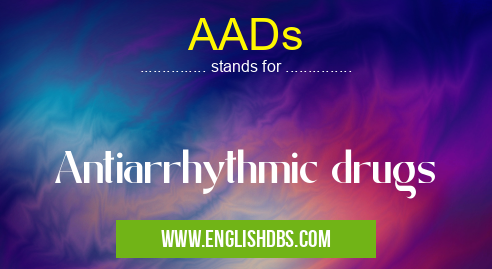What does AADS mean in DRUGS
Antiarrhythmic drugs are medications prescribed to regulate the heart rate and electrical activity, specifically to treat arrhythmias. These drugs, also known as AADs, can reduce the risk of cardiac arrest, stroke and other cardiovascular events.

AADs meaning in Drugs in Medical
AADs mostly used in an acronym Drugs in Category Medical that means Antiarrhythmic drugs
Shorthand: AADs,
Full Form: Antiarrhythmic drugs
For more information of "Antiarrhythmic drugs", see the section below.
Essential Questions and Answers on Antiarrhythmic drugs in "MEDICAL»DRUGS"
What is an antiarrhythmic drug?
An antiarrhythmic drug (AAD) is a medication designed to regulate heart rate and electrical activity, specifically treat arrhythmias.
Who needs to take an antiarrhythmic drug?
People who have been diagnosed with an arrhythmia may take an antiarrhythmic drug (AAD) as part of their treatment plan. However, not all people with arrhythmias need to take this type of medication. Your doctor will determine if you need an AAD based on your individual health needs and medical history.
How do antiarrhythmic drugs work?
Antiarrhythmic drugs (AADs) work by reducing or blocking the abnormal electrical impulses that cause irregular rhythms in the heart muscle. This helps restore normal heart rhythm and minimize any risks or complications associated with arrhythmias.
Final Words:
In conclusion, Antiarrhythmic Drugs (AADs) are medications used to treat irregular heart rhythm or arrhythmias. They help restore normal heartbeat patterns and reduce the risks associated with these conditions. Before taking any type of AAD it is important to consult your doctor for advice on if and how it can be safely used for your health needs.
AADs also stands for: |
|
| All stands for AADS |
